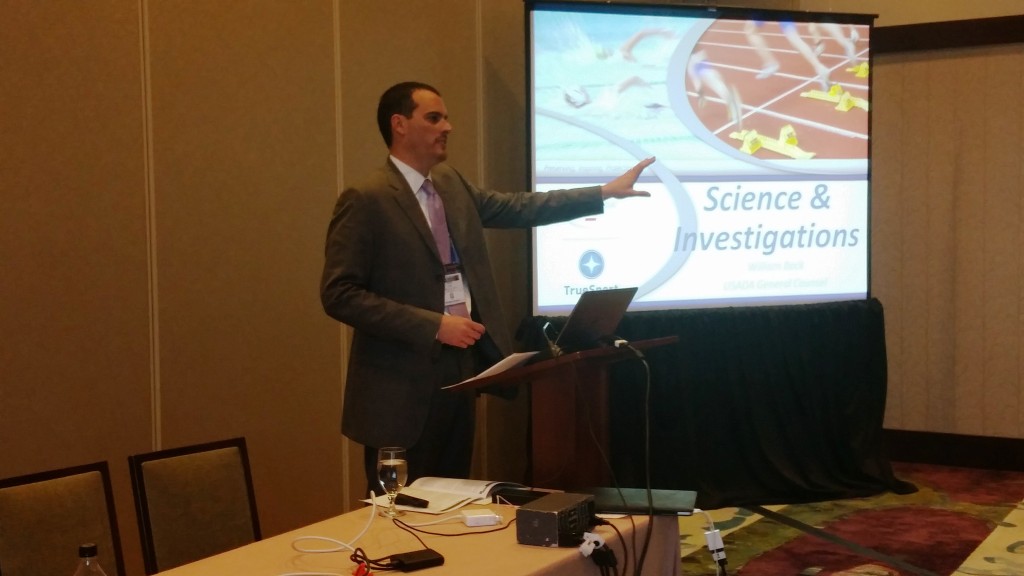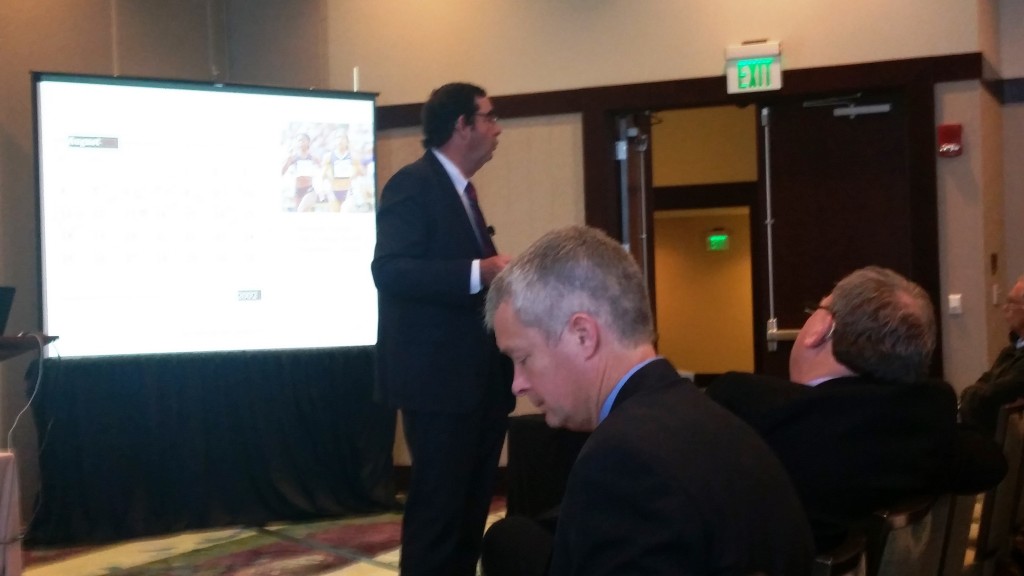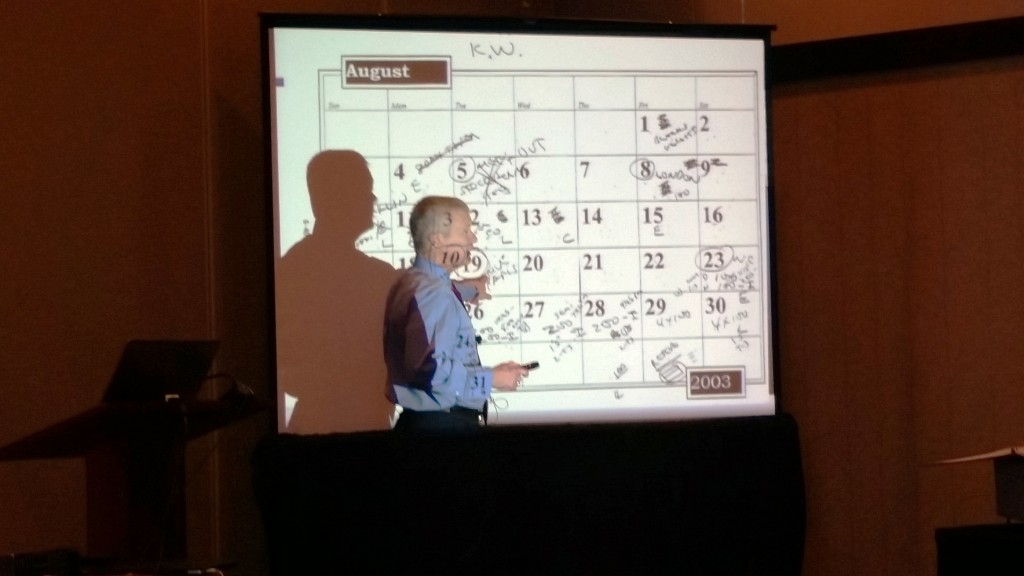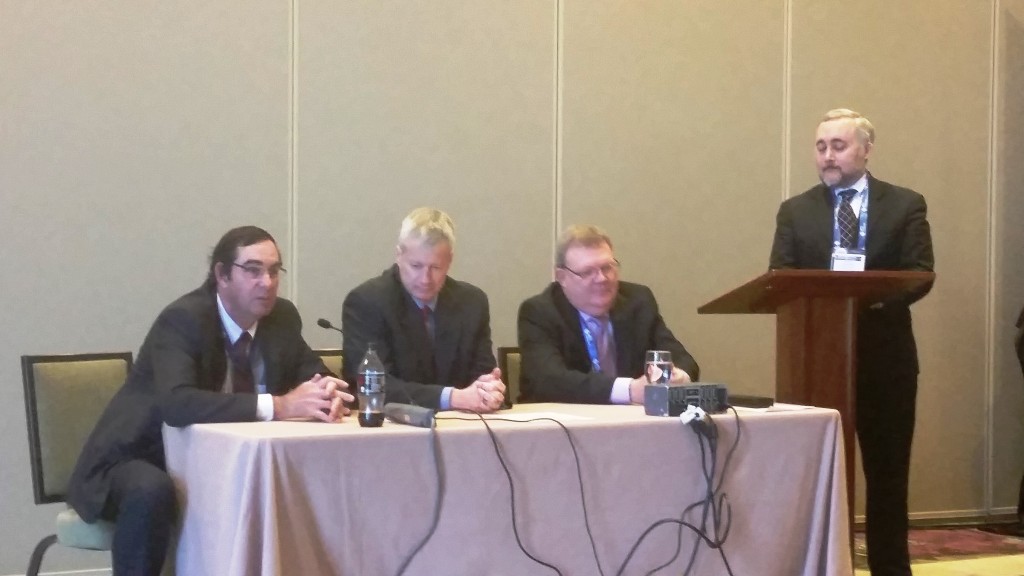USADA presents at the ACS National Meeting about Doping in Sports

On March 23, 2015, Attorneys Justin J. McShane of The McShane Firm, LLC and Josh D. Lee of Ward, Lee and Coats moderated a symposium at the national American Chemical Society meeting in Denver, Colorado. The symposium concerned the chemistry and the law involved in Doping in Sports. Officials from the United States Anti-Doping Administration were present. The presentation was made within the Chemistry and the Law Division of the American Chemical Society.

Biographical Sketches of the Presenters
- Rich Young is the Managing Partner of the Bryan Cave LLP office in Colorado Springs, Colorado. Over the last 20 years, he has participated as a prosecutor, defense counsel, arbitrator or adviser in hundreds of sport doping cases involving most of the Olympic sports. Mr. Young served as the principal draftsman of the World Anti-Doping Code and Code amendments, and has presented the Code at numerous international conferences on doping in sport. He has also assisted in drafting anti-doping rules for numerous International Federations, National Federations, National Olympic Committees and National Anti-Doping Organizations. Mr. Young serves as a legal advisor to the United States Anti-Doping Agency, the Australian Sports AntiDoping Authority, the PGA Tour, lronman, the NBA and other professional sports, as well as several International Federations. Mr. Young is a member of the ad hoc World Anti-Doping Agency Legal Committee and the Pan American Sports Organization Medical Commission. He has also been an arbitrator for the International Court of Arbitration for Sport, and served on its ad hoc panels for the Sydney and Nagano Olympic Games.
- Dr. Larry Bowers is the Chief Science Officer of the U.S. Anti-Doping Agency. From 1992- 2000, Dr. Bowers was the Laboratory Director of the International Olympic Committee-accredited laboratory at Indiana University. Prior to his tenure at IU, he was a Professor of Laboratory Medicine and Pathology and an Adjunct Professor of Chemistry at the University of Minnesota for 17 years. He has published over 100 scientific articles and chapters on chromatography, mass spectrometry, steroid and peptide analysis, and anti-doping policy. He has received a number of awards, including the American Association for Clinical Chemistry Young Investigator award and the Franklin and Marshall College Distinguished Career award. In 2000, he joined the US Anti-Doping Agency as its third employee and has been responsible for developing most of its scientific policies and procedures over the last 15 years. Dr. Bowers has had the opportunity over the past decade to participate in many of the major milestones in anti-doping. He was the principal author of the WADA International Standard for Laboratories and many of its attendant Technical Documents in 2002. He participated in the BALCO legal action and has served as an expert witness in numerous legal cases over the last 20 years including the Barry Bonds trial. He also serves as the Chair of the Scientific Advisory Board of the Partnership for Clean Competition (PCC), a research-funding consortium of major U.S. sports organizations.
- Bill Bock became General Counsel for USADA in September, 2007. Prior to becoming General Counsel Bill had served USADA as outside counsel for seven years. As USADA’s General Counsel, Bill has principal responsibility for the prosecution of U.S. athletes and coaches charged with doping offenses, investigations and other legal matters pertaining to USADA. In 2010 Bill became deeply involved in USADA’s investigation into doping in cycling and in the proceedings involving Lance Armstrong and team officials and doctors from the United States Postal Service (USPS) cycling team. Bill was named as a lawyer of the year in 2012 by Colorado Law Week and in 2013 was designated as a Distinguished Barrister by the Indiana Lawyer. He was selected as a 2014 honoree for the NASBA Center for Public Trust’s Being a Difference Award and was named a 2015 Super Lawyer in the State of Indiana.
Presentation Overviews
Dr. Bowers presented first. He presented a short historical overview of doping and anti-doping evolution over the period from 1900 to 2000 that lead to the formation of the World AntiDoping Agency (WADA) and the US Anti-Doping Agency (USADA). He briefly summarized the governance of international Olympic sport.
Mr. Young discussed the evolution of doping practices by athletes and the anti-doping rules and methods that have been put in place to detect and sanction dopers. This discussion included the World Anti-Doping Code and its supporting International Standards developed by the World Anti-Doping Agency. He also discussed the shift to out-of-competition testing and specialized laboratory analytical techniques designed to catch up to or hopefully stay ahead of the evolving practices of dopers trying to beat the system.

Dr. Bowers again presented. Deterrence is the primary goal of anti-doping. The decision to follow the rules is primarily determined by an individual’s moral inhibitions. When moral inhibitions are weak, the certainty of being caught is the most important factor in compliance with the rules. The ability of testing to detect prohibited substances and methods plays a major role in the certainty of being caught. Several examples of advances in detection of anabolic steroids were presented, including the chemistry underlying the discovery of long-lived metabolites and the detection of designer steroids.
Bill Bock presented on his role as general counsel for USADA and the investigations that he has been part of. The U.S. Anti-Doping Agency (USADA) is the congressionally authorized, independent anti-doping agency for Olympic and Paralympic Movement Sport in the United States and conducts drug testing and drug investigations for America’s elite and Olympic athletes. With particular focus on the USADA investigation into doping by Lance Armstrong and his teammates on the U.S. Postal Service Cycling team as well as the Bay Area Laboratory Cooperative (BALCO) investigation, which involved unlawful conduct by athletes including Marion Jones, Barry Bonds, and Tim Montgomery, USADA’s General Counsel, Bill Bock, discussed how USADA conducts investigations regarding the use of performance enhancing drugs in sport, promoting a level playing field in sport in the United States.

Dr. Eichner was called away on official WADA duties. So Dr. Bowers presented his slides and information. The World Anti-Doping Agency has the primary responsibility to harmonize anti-doping practice in international sport. The World Anti-Doping Code and the attendant International Standards, Technical Documents, and Guidelines form the framework of that harmonization. The List of Prohibited Substances and Methods and the International Standard for Laboratories are critical to harmonization. WADA recognizes laboratories to conduct doping control analysis for Olympic sports under agreements with national/SO accrediting organizations to assess under ISO 17025. Testing strategies and practice have evolved over the years. WADA-accredited laboratories have moved from reactionary, to be more proactive in the fight against doping. Anticipating potential doping agents progressing through clinical trials and scientific research are paramount in staying ahead of doping athletes. Focusing on “indirect” methods of detection offer the laboratories a way to detect endogenous hormones and other performance-enhancing practices that are not possible to detect directly. There are also numerous rogue companies that exploit the FDA’s “research use only” classification of drugs to target athletes.
At the end of the session, there was a lively Q&A where the audience got to directly ask about Lance Armstrong, Carl Lewis and others. The issue about the anti-doping culture (or lack thereof) in other countries was discussed in terms of policy. The panelists were frank and forthright with their comments. It was a great event.



